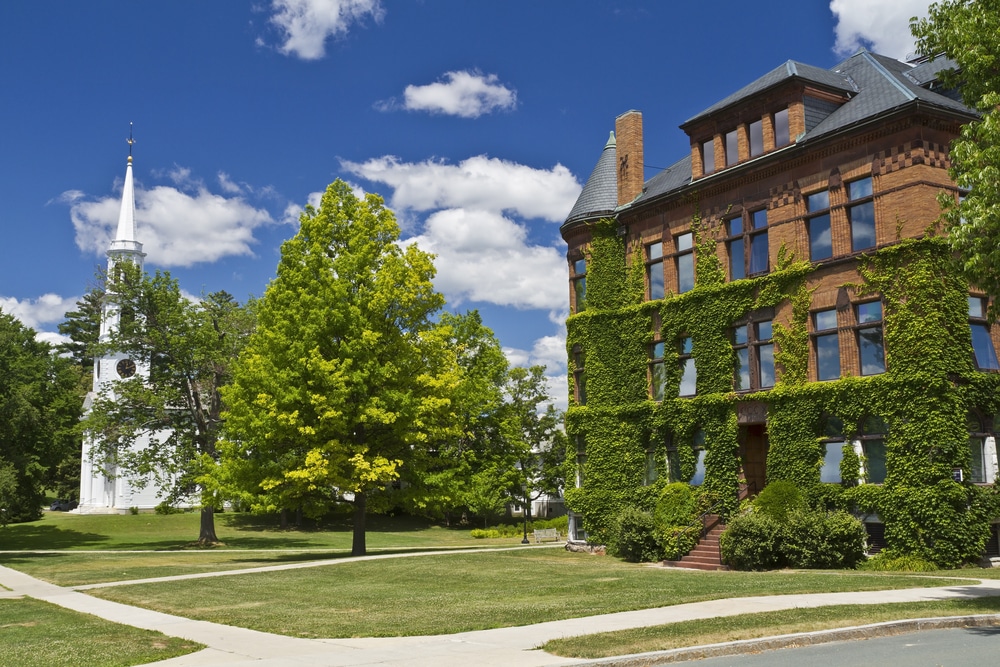Williams Acceptance Rate: Admissions Statistics
Williams College is a prestigious institution located in Williamstown, Massachusetts. Known for its rigorous academics and highly competitive admissions process, Williams is a dream school for many aspiring students. With an acceptance rate of just 9.8%, it is no surprise that gaining admission to Williams is no easy feat.
What is Williams’ Acceptance Rate?
Williams College is renowned for its highly selective admissions process, evidenced by its low acceptance rate of 9.8%. This means that out of every 100 applicants, less than 10 are offered admission. With thousands of applications pouring in each year, the competition to secure a spot at Williams is fierce. While William’s acceptance rate is undoubtedly daunting, it is a testament to the caliber of students who are ultimately admitted.
Williams College has a long-standing reputation for academic excellence and a commitment to providing students with a rigorous liberal arts education.
When it comes to the admissions process, Williams College takes a holistic approach to evaluating applicants. While a high GPA and standardized test scores are important, the college also considers factors such as extracurricular involvement, letters of recommendation, and personal essays. The admissions committee carefully reviews each application to ensure admitted students excel academically and contribute to the diverse and vibrant campus community.
With an acceptance rate of 9.8%, Williams College is highly selective in choosing its incoming class. Williams’ low acceptance rate reflects the high level of competition among applicants. Students admitted to Williams College can take pride in their achievement, knowing they have been chosen from a pool of highly qualified candidates.
Once admitted, students at Williams College have access to a wide range of academic and extracurricular opportunities. The college offers over 60 majors and concentrations, allowing students to explore their interests and pursue their passions. Whether conducting research with faculty, participating in community service projects, or joining one of the college’s numerous student organizations, Williams College provides a supportive and enriching environment for students to grow and thrive.
Williams College also boasts a strong alumni network, with graduates making significant contributions in various fields such as business, academia, and the arts. The college’s reputation and rigorous academic programs prepare students for success beyond graduation, opening doors to exciting career opportunities and graduate school placements.
Williams College’s acceptance rate of 9.8% reflects its commitment to selecting students who excel academically and contribute to the vibrant campus community. The college’s rigorous academic programs, extensive extracurricular opportunities, and strong alumni network make it an excellent choice for students seeking a top-tier liberal arts education.
Who studies at Williams?
When it comes to diversity across the board, Williams College ranks very highly. They received a CollegeFactual score of 95 out of 100 for overall diversity and were ranked as the 24th most diverse school out of 2,475.
When it comes to ethnic diversity, here are the major groups that call Williams home:
- 51.4% of the students at Williams College are white
- 12.9% of the students at Williams College are Hispanic/Latino
- 12.3% of the students at Williams College are Asian
- 8.2% of the students at Williams College are Non-resident Alien
- 8.2% of the students at Williams College African-American
Regarding gender diversity, male and female students have split down the middle relatively evenly, with just over 50 percent identifying as male.
Finally, when it comes to international students, Williams College is quite strong as well. While it does not compare to the international student presence at Ivy League schools or elite public schools, just under 10 percent of the student body at Williams is made up of international students.
Overall, the central countries that send the most significant number of students to Williams include:
- Canada
- United Kingdom
- Kenya
- Hong Kong
- Pakistan
Williams College Early Action and Early Decision Acceptance Rates
Williams College offers both Early Action (EA), Early Decision (ED), and Regular Decision (RD) application rounds. The Early Action plan is non-binding, meaning that if admitted, the student is not required to enroll at Williams College and can still apply to other colleges. The Early Action acceptance rate for the Class of 2028 was 23%. The Early Decision plan is binding, meaning that if admitted, the student must enroll at Williams College and withdraw all other applications. The Early Decision acceptance rate for the Class of 2028 was 23.3%. The Regular Decision acceptance rate for the Class of 2028 was 9.8%.
The Early Decision (ED) acceptance rates for Williams College for the last 5 years are as follows:
| Class | ED |
| 2028 | 23.3% |
| 2027 | 27% |
| 2026 | 31.3% |
| 2025 | no data |
| 2024 | no data |
Trends in Williams’ Acceptance Rates
Over the years, Williams’ acceptance rate has remained consistently low, with only marginal fluctuations. This stability reflects the college’s commitment to maintaining high standards and admitting students who demonstrate exceptional intellectual curiosity, academic prowess, and a genuine passion for learning. Adhering to such stringent criteria ensures that the student body comprises individuals who will thrive in Williams’ challenging academic environment.
Williams College is renowned for its rigorous academic programs and commitment to fostering a vibrant intellectual community. The college’s dedication to excellence is evident in its highly selective admissions process, contributing to its reputation as one of the top liberal arts colleges in the United States.
| Year | Applicants | Admittees | Acceptance Rate |
| 2022-2023 | 10,315 | 858 | 9.80% |
| 2021-2022 | 15,321 | 1,303 | 9% |
| 2020-2021 | ≃12,500 | ≃1,000 | 8% |
| 2019-2020 | 9,715 | 1,224 | 13% |
| 2018-2019 | no data | no data | no data |
One factor contributing to the consistently low acceptance rate at Williams is the college’s emphasis on holistic admissions. Admissions officers carefully review each application, considering an applicant’s academic achievements, extracurricular involvement, leadership potential, and personal qualities. This comprehensive evaluation ensures that each admitted student brings a unique perspective and contributes to the diverse and dynamic campus community.
Williams College also takes pride in its commitment to providing a supportive and inclusive environment for all students. The college offers a wide range of resources and support services, including academic advising, career counseling, and wellness programs, to help students academically and personally thrive. This commitment to student success is reflected in the college’s low student-to-faculty ratio, which allows for personalized attention and mentorship.
Furthermore, Williams College is known for its strong alumni network, which provides students with valuable connections and opportunities beyond graduation. Alumni often return to campus to engage with current students, sharing their experiences and insights and offering guidance as they navigate their post-college careers. This network of successful and accomplished individuals further enhances the value of a Williams education.
As Williams continues to attract a highly competitive applicant pool, the college remains committed to providing an exceptional education to diverse students. Wiliiams’ low acceptance rate is a testament to the college’s dedication to academic excellence and its unwavering commitment to shaping the next generation of leaders and innovators.
SAT/ACT Scores for Williams Admits
When it comes to gaining admission to Williams College, a prestigious institution known for its commitment to a holistic approach to admissions, standardized test scores hold significant weight. While the college values a comprehensive evaluation of each applicant, the SAT and ACT scores still serve as important indicators of academic preparedness.
Williams College prides itself on attracting a diverse and talented student body, and the middle 50% of admitted students typically showcase impressive SAT scores. With a rigorous curriculum and a commitment to intellectual growth, the college looks for students who have demonstrated their academic ability.
The SAT and ACT score ranges for admitted students to Williams College are as follows:
- SAT: 1490–1550, 1410-1550, 1480-1570, 1479-1512, 1550 (75th percentile)
- ACT: 34–35, 32-35, 34-35, 35 (75th percentile)
It’s important to note that while these scores are essential, Williams College also considers other factors in the admissions process, and many admitted students may have scores outside of these ranges. This range further emphasizes the college’s commitment to attracting students who have proven their academic prowess and ability to thrive in a challenging academic environment.
At Williams College, the goal is to create a vibrant and intellectually stimulating community where students can engage in meaningful discussions, pursue their passions, and positively impact the world. The SAT and ACT scores serve as a benchmark for prospective students, providing them with an understanding of the academic expectations and challenges they may encounter at Williams. However, it is essential to remember that these scores do not define an applicant’s worth or potential for success at the college.
Ultimately, Williams College seeks students who excel academically and possess a genuine curiosity, a passion for learning, and a desire to make a difference. The college values diversity, inclusivity, and a collaborative spirit, and it is through a comprehensive evaluation process Williams aims to identify individuals who will contribute to the vibrant intellectual community that defines the college.
What is Williams looking for?
Williams College values individuals who possess intellectual curiosity, a genuine passion for learning, and the ability to think critically and analytically. Beyond academic achievements, the college seeks applicants with leadership potential, a commitment to service, and a diverse range of interests. Williams aims to build a community of scholars who will engage in meaningful discussions, challenge conventional wisdom, and ultimately contribute to the world in a positive way.
- Holistic Selection Criteria at Williams College: At Williams College, the pursuit of exceptional individuals extends beyond traditional academic benchmarks. While grades and test scores hold significance, the college places paramount importance on authentic intellectual development fueled by an unwavering passion for learning.
- Emphasis on Critical Thinking: Williams seeks applicants distinguished by their capacity for critical and analytical thinking. The institution recognizes that success in today’s intricate world demands the ability to analyze information, assess arguments, and cultivate independent perspectives. Williams actively looks for students capable of approaching challenges from diverse angles and challenging their assumptions.
- Leadership in Varied Contexts: Beyond intellectual prowess, Williams College values applicants with leadership potential. The college asserts that leadership transcends formal roles and can manifest in diverse settings, from guiding a club to spearheading community service initiatives. Williams seeks individuals who can inspire and motivate others, demonstrating a commitment to positive community impact.
- Commitment to Service: Service is a pivotal criterion for Williams, viewing it as a catalyst for personal and communal transformation. The college actively seeks students with a track record of dedication to others through volunteerism, participation in social justice endeavors, or engagement in community-based research. Williams believes that a commitment to service enhances personal development and contributes to societal betterment.
- Celebrating Diverse Interests: Finally, Williams College values applicants with a broad spectrum of interests. Acknowledging that diverse backgrounds and experiences enrich intellectual communities, the college actively seeks students who have pursued passions beyond the classroom. Whether through involvement in the arts, athletics, community organizations, or other extracurricular activities, Williams believes that diverse interests foster creativity, collaboration, and a well-rounded educational experience.
Williams College is looking for individuals who possess intellectual curiosity, a genuine passion for learning, and the ability to think critically and analytically. The college also values leadership potential, a commitment to service, and a diverse range of interests. By seeking out these qualities, Williams aims to build a community of scholars who will engage in meaningful discussions, challenge conventional wisdom, and ultimately positively impact the world.
How hard is it to get into Williams?
Gaining admission to Williams College is undeniably a challenging endeavor. The college’s selective admissions process and the competitive applicant pool create an environment where prospective students must distinguish themselves in unique ways. While exceptional academic achievements and standardized test scores are essential, Williams also values an applicant’s personal qualities, essays, recommendations, and extracurricular involvement. Each application is carefully reviewed, and the decision-making process considers the entirety of the applicant’s profile.
Aspiring students who wish to join the ranks of the Ephs must possess exceptional academic prowess and a genuine passion for learning. Williams seeks individuals who are intellectually curious, driven, and eager to make a positive impact on the world. The college values diversity in all its forms and actively seeks students from various backgrounds and experiences.
The admissions committee at Williams College takes a holistic approach to evaluating applications. They understand that grades and test scores cannot solely determine a student’s potential. Instead, they delve deep into each applicant’s qualities, looking for evidence of leadership, resilience, and a commitment to making a difference. The essays and recommendations provide a glimpse into the applicant’s character, allowing the committee to assess their potential to contribute to the vibrant intellectual community on campus.
While the acceptance rate at Williams may be intimidating, hovering around 12%, it is a testament to the caliber of education and the incredible opportunities that await those fortunate enough to call Williams their alma mater. The college’s rigorous academic environment challenges students to push their intellectual boundaries, fostering a love for learning far beyond the classroom.
Moreover, Williams College offers various extracurricular activities and student organizations catering to various interests. From performing arts groups to community service initiatives, there is something for everyone to get involved in and contribute to the vibrant campus life. Students at Williams are encouraged to explore their passions, pursue their interests, and develop leadership skills that will serve them well beyond their college years.
Williams Popular Programs
Williams College offers diverse academic programs catering to a wide range of interests and career aspirations. The college is committed to providing students with a robust and engaging education from the humanities to the sciences. Here are some of the popular programs at Williams College:
- Economics:
- Williams’ Economics program is renowned for its comprehensive curriculum and emphasis on critical thinking. Students delve into micro and macroeconomic principles, applying analytical tools to real-world issues. The program prepares graduates for finance, consulting, and public policy careers.
- Biology:
- The Biology program at Williams College offers a rigorous exploration of life sciences. From molecular biology to ecology, students engage in hands-on research and gain a deep understanding of biological processes. This program serves as a foundation for research, healthcare, and environmental science careers.
- English:
- The English program at Williams is celebrated for its focus on literature, writing, and critical analysis. Students explore diverse texts, honing their writing skills and analytical thinking. Graduates often pursue publishing and journalism careers or continue to advanced studies in literature.
- Political Science:
- Williams College’s Political Science program provides a comprehensive understanding of political systems, theories, and international relations. Students critically analyze political phenomena and develop the skills needed for government, law, or advocacy careers.
- Computer Science:
- With the growing importance of technology, Williams College’s Computer Science program is highly sought after. Students learn programming languages, algorithms, and software development, preparing them for roles in the tech industry, software engineering, and data analysis.
- Psychology:
- The Psychology program at Williams delves into the complexities of human behavior and cognition. Students engage in research projects and gain insights into psychological theories. This program is a stepping stone for counseling, clinical psychology, or research careers.
- Mathematics:
- The Mathematics program at Williams College is known for its rigorous curriculum covering a broad spectrum of mathematical concepts. Students develop strong analytical and problem-solving skills, preparing them for finance, academia, or technology careers.
- Art History:
- Williams College offers a vibrant Art History program, allowing students to explore the history and interpretation of visual arts. This program prepares students for museums, galleries, or art curation careers.
These popular programs showcase the diversity and academic excellence that define Williams College, providing students with the knowledge and skills needed for success in their chosen fields.
How to know which major is for you
Choosing a major can be a significant decision that impacts your academic and career path. Here are some steps to help you determine which major is the right fit for you:
- Self-Reflection:
- Reflect on your interests, passions, and hobbies. Consider what subjects you enjoy studying and find intellectually stimulating. Think about activities that make you lose track of time or topics you enjoy discussing with others.
- Strengths and Skills:
- Identify your strengths and skills. What are you naturally good at? Your strengths and skills can guide you toward majors that align with your abilities and talents.
- Career Exploration:
- Explore potential careers associated with different majors. Research job prospects, industries, and the skills required for various professions. Consider talking to professionals in fields you find interesting.
- Take Introductory Courses:
- Enroll in introductory courses in different disciplines. Many universities allow students to explore a variety of subjects before declaring a major. Intro courses can provide a taste of what each major entails.
- Talk to Academic Advisors:
- Schedule meetings with academic advisors or career counselors. They can provide guidance, discuss your academic interests, and help you explore majors that align with your goals.
- Networking and Informational Interviews:
- Connect with professionals in different fields through networking events or informational interviews. Gain insights into their career paths, daily responsibilities, and the educational background required for their roles.
- Internships and Volunteering:
- Participate in internships or volunteer opportunities related to different fields. Practical experience can provide valuable insights into the day-to-day aspects of various professions.
- Consider Interdisciplinary Options:
- Explore interdisciplinary majors that combine multiple fields of study. These programs may allow you to integrate your interests and pursue a unique academic path.
- Evaluate Coursework and Requirements:
- Review the coursework and requirements for potential majors. Consider whether the classes are engaging and whether the major aligns with your long-term goals.
- Seek Guidance from Mentors:
- Seek advice from mentors, teachers, or professionals in your network. They may share their experiences, offer insights, and provide valuable advice on choosing a major.
- Personal Values and Goals:
- Consider your values and long-term goals. What kind of impact do you want to make in your career? Choose a major that aligns with your values and contributes to your life goals.
- Be Open to Change:
- Keep in mind that it’s okay to change majors. Your interests and goals may evolve as you gain exposure to different subjects and experiences.
Prospective students must explore the complete list of majors offered at Williams and consider their interests and career goals when choosing a major. Additionally, students often have the flexibility to pursue interdisciplinary studies and customize their academic paths.
How will I know if Williams is for me?
Determining if Williams College is the right fit for you involves considering various factors related to your academic, personal, and social preferences. Here are some key aspects to consider when evaluating if Williams is the right match for you:
- Academic Fit:
- Curriculum: Examine the academic programs and majors offered at Williams. Ensure they align with your interests and career goals.
- Class Size: Consider your preference for class sizes. Williams, a liberal arts college, often emphasizes small class sizes, fostering close interactions between students and faculty.
- Campus Culture:
- Community Atmosphere: Research the campus culture and community vibe. Williams is known for its close-knit community, so if you thrive in a tight community where relationships matter, it could be a good fit.
- Extracurriculars: Explore the extracurricular activities and clubs available. If there are clubs or activities aligned with your interests, it could enhance your overall college experience.
- Location:
- Rural Setting: Williams is in a picturesque rural setting in Williamstown, Massachusetts. Consider whether you prefer a rural environment or are more inclined toward an urban setting for your college experience.
- Values and Philosophy:
- Liberal Arts Focus: Understand and appreciate the liberal arts philosophy. Williams emphasizes a broad-based education, encouraging exploration across disciplines.
- Research Opportunities:
- Undergraduate Research: If you are interested in research opportunities, check if Williams provides ample resources and support for undergraduate research projects.
- Facilities and Resources:
- Library and Labs: Assess the quality of academic facilities, including libraries and laboratories. Ensure they meet your expectations and requirements for your chosen field of study.
- Financial Considerations:
- Financial Aid: Consider the options available and whether they align with your financial situation. Evaluate the overall cost of attendance and the potential return on investment.
- Alumni Success:
- Alumni Network: Research the success stories of Williams College alumni. If graduates’ achievements align with your aspirations, it may indicate a good fit.
- Visit the Campus:
- Campus Visit: Whenever possible, visit the campus to get a feel for the environment. Attend information sessions, tour the facilities, and engage with current students to gain firsthand insights.
- Your Gut Feeling:
- Personal Connection: Trust your instincts. It could be a positive sign if you feel a personal connection or a sense of belonging during your interactions with the college and its community.
Attending a particular college is highly personal, and each individual’s priorities and preferences differ. Take the time to thoroughly research and reflect on what matters most to you in a college experience. If possible, consult with current students or alumni to gain additional perspectives.
Williams Admission Requirements
Williams College is highly selective, with an acceptance rate of 9.8%. That said, admission requirements are a must-know when applying for the college. Here are the general guidelines that were applicable as of that time:
- Application Form:
- Complete the Common Application, including the personal essay and Williams-specific writing supplement.
- High School Transcripts:
- Submit official high school transcripts, including information about your coursework and grades.
- Letters of Recommendation:
- Typically, two letters of recommendation are required. These letters are often written by teachers who can speak to your academic abilities and personal qualities.
- Extracurricular Activities:
- Highlight your involvement in extracurricular activities, leadership roles, and any remarkable achievements or talents.
- Interviews:
- While not required, interviews are encouraged. They allow you to discuss your interests and learn more about Williams.
- Financial Aid Information:
- If you are applying for financial aid, submit the necessary forms and documentation.
- Optional Arts Portfolio:
- If you have a strong interest and talent in the arts, you may choose to submit an optional arts portfolio.
- Demonstrated Interest:
- While not a strict requirement, expressing genuine interest in Williams can be beneficial. Attend information sessions, visit the campus, or participate in virtual events.
- Additional Requirements for International Students:
- International students may have additional requirements, such as proof of English proficiency (TOEFL or IELTS) and documentation of financial support.
It’s crucial to note that admission requirements and policies may be updated. Therefore, for the most accurate and current information, visit the official Williams College admissions website or contact the admissions office directly. Additionally, remember that the information provided here is based on my knowledge as of January 2022, and there may have been changes since then.
Key Application Deadlines for Williams
Williams College has several application deadlines for different types of applicants. For first-year applicants, the Early Decision application deadline is November 15, 2023, and the Regular Decision application deadline is January 8, 2024.
The deadline for submitting standardized test scores (optional) is October, December, or February, depending on the application deadline. The financial aid application deadline is the same as the admission application deadline. Admissions decisions for Early Decision applicants are typically released by December 15, while Regular Decision applicants are notified by April 1. Transfer students may only apply for fall enrollment, and the application deadline is March 1, 2024. Applicants will be informed of their class standing at the point of admission.
Reviewing the specific deadlines and requirements for your application type on the Williams College website or Common Application is essential.
Tuition Costs at Williams for 2023-2024
The comprehensive fee for the 2023-2024 academic year, which includes tuition, housing, meals, and mandatory student fees, is $81,160 without study away and $82,660 with study away. The tuition cost for the 2023-2024 academic year is $64,540.
It’s important to note that these costs do not include additional expenses such as textbooks, art and lab supplies, and personal expenses like haircuts or a data plan for your phone. Williams College is committed to providing financial aid to students who need it, with a financial aid program that meets 100% of demonstrated needs.
If you are considering applying to Williams College, reviewing the specific costs and financial aid opportunities provided on the college’s official website is essential.
When evaluating tuition costs at Williams College, several factors come into play. Here are key considerations that prospective students and their families should take into account:
- Tuition and Fees:
- The most straightforward component is the tuition itself. This is the base cost of attending classes and accessing academic resources. Additionally, be aware of any mandatory fees associated with enrollment.
- Room and Board:
- The cost of room and board includes housing and meals. Williams College typically offers various housing options, from dormitories to on-campus apartments. The choice of meal plans can also impact costs.
- Financial Aid and Scholarships:
- Investigate the availability of financial aid and scholarships. Williams is committed to meeting 100% of the demonstrated financial need for admitted students. Understand the available aid types, including grants, scholarships, and work-study programs.
- Work-Study Opportunities:
- Explore work-study opportunities that may be part of your financial aid package. Work-study programs allow students to gain work experience while helping to cover educational expenses.
- Books and Supplies:
- Consider the cost of textbooks and other academic supplies. This can vary depending on your major and the specific courses you take.
- Personal Expenses:
- Budget for personal expenses such as transportation, clothing, and miscellaneous items. The cost of living surrounding Williams College should also be considered.
- Health Insurance:
- Understand the health insurance requirements and costs. Some colleges, including Williams, may offer or require student health insurance coverage, which can impact overall expenses.
- Travel Expenses:
- If you’re traveling a significant distance to attend Williams College, factor in the cost of travel for holidays and breaks.
- Cost of Living in the Area:
- Consider the overall cost of living in Williamstown, Massachusetts. This includes potential off-campus living costs if you choose not to live on campus after the first year.
- Payment Plans:
- Investigate available payment plans. Some colleges, including Williams, offer options for spreading tuition payments over the academic year.
- Potential Tuition Increases:
- Be aware that tuition and fees can increase over the years. Check the college’s historical trends and policies regarding tuition increases.
- Part-Time Employment:
- Assess the feasibility of part-time employment during the school year. Understand how balancing work and academics may impact your overall college experience.
It’s essential for prospective students and their families to carefully review the financial details and consider the complete picture of expenses associated with attending Williams College. Additionally, contacting the college’s financial aid office can provide valuable insights and assistance in understanding and managing costs.
Williams Scholarships
Williams College is committed to meeting 100% of the demonstrated financial need for admitted students. The college follows a need-blind admission policy, meaning that an applicant’s financial need does not influence the admission decision. Instead, Williams aims to make its education accessible to all admitted students by providing financial aid packages that cover the full demonstrated need.
Here are some critical points about scholarships and financial aid at Williams College:
- Need-Based Financial Aid:
- Williams College primarily offers need-based financial aid rather than merit-based scholarships. The financial aid package is determined based on the family’s financial situation, and the demonstrated need is calculated through a comprehensive evaluation process.
- CSS Profile and FAFSA:
- To apply for financial aid at Williams, students must typically submit the CSS Profile (College Scholarship Service Profile) and the Free Application for Federal Student Aid (FAFSA). These forms help assess the family’s financial situation.
- No-Loan Policy:
- Williams has a no-loan financial aid policy. This means that financial aid packages typically do not include loans; instead, they consist of grants, work-study opportunities, and other forms of aid that do not need to be repaid.
- Work-Study Opportunities:
- Work-study programs may be part of the financial aid package, allowing students to gain work experience while contributing to their educational expenses.
- International Student Aid:
- Williams College is committed to meeting the demonstrated financial need of admitted international students. The financial aid process for international students is similar to that for domestic students.
- Merit-Based Scholarships:
- While Williams primarily focuses on need-based financial aid, limited merit-based scholarships or awards for exceptional talent or achievements in specific areas may exist. These opportunities are less common compared to the emphasis on need-based aid.
- Financial Aid Office:
- The Williams College Financial Aid Office is a valuable resource for prospective and current students seeking information about financial aid options, application procedures, and policy updates.
It’s essential for prospective students to carefully review the financial aid policies on the official Williams College website and to contact the Financial Aid Office directly for the most accurate and up-to-date information. The financial aid landscape can change, so staying informed and seeking guidance from the college’s financial aid professionals is crucial in making informed decisions about the cost of attendance.
Student Life at Williams
Williams College offers a vibrant student life with various personal and intellectual growth opportunities. Students can participate in over 150 student-run organizations on campus, including clubs and organizations related to academics, arts, athletics, community service, and more.
Williams College also offers a range of co-curricular experiences and leadership development opportunities, including Accessible Education, Residential Life & Housing, and Student Involvement & Events. The college is committed to supporting students’ well-being with resources such as the Health Center, the Chaplains’ Office, and the Davis Center. The campus also offers a range of recreational activities, including hiking, skiing, and other outdoor activities. While the social scene at Williams College is dominated by drinking and drinking games, the college also offers alternative events such as Williams After Dark, which features activities that don’t involve alcohol.
Williams College offers a supportive and engaging community that fosters personal and intellectual growth.
Academics at Williams
Here are vital aspects of academics at Williams:
- Liberal Arts Education:
- Williams follows a liberal arts education model, emphasizing a broad and interdisciplinary approach to learning. Students are encouraged to explore a variety of subjects across different disciplines, fostering critical thinking, creativity, and a well-rounded education.
- Majors and Minors:
- Williams offers a wide range of majors and minors, allowing students to tailor their academic experience to their interests and career goals. Popular majors include economics, political science, biology, mathematics, and English.
- Small Class Sizes:
- One distinctive feature of Williams is its small class sizes. The college maintains a low student-to-faculty ratio, facilitating close interactions between professors and students. This intimate learning environment allows for personalized attention and meaningful class discussions.
- Distinguished Faculty:
- Williams College boasts a faculty of accomplished scholars and experts in their fields. Professors are dedicated to teaching and research, allowing students to engage in cutting-edge academic inquiries.
- Research Opportunities:
- Williams places a strong emphasis on undergraduate research. Students can collaborate with faculty on research projects, contributing to advancements in various fields. The college’s commitment to research is reflected in its state-of-the-art facilities and resources.
- Critical Thinking and Writing:
- The curriculum at Williams is designed to cultivate critical thinking and effective communication skills. Writing is emphasized across disciplines, ensuring students can express their ideas clearly and persuasively.
- Experiential Learning:
- Beyond the classroom, Williams encourages experiential learning. Students have internships, study abroad programs, and community engagement opportunities, providing practical applications of their academic knowledge.
- Advising and Support:
- Williams College places a strong emphasis on academic advising. Each student is assigned an academic advisor who guides course selection, career planning, and overall academic progress. The college is dedicated to supporting students throughout their academic journey.
- Advanced Study Opportunities:
- Williams offers programs for advanced study, including tutorials and independent study projects. These opportunities allow students to pursue in-depth exploration of specific topics under the guidance of faculty mentors.
- Interdisciplinary Programs:
- The college encourages interdisciplinary studies through various programs, allowing students to integrate knowledge from multiple disciplines. This approach promotes a holistic understanding of complex issues.
- Community of Scholars:
- Williams College fosters a vibrant community of scholars where intellectual curiosity is celebrated. The college organizes lectures, symposiums, and other events that bring together students, faculty, and visiting scholars to engage in meaningful academic discourse.
Williams College’s commitment to academic excellence and supportive learning environment make it a compelling choice for students seeking a challenging and enriching educational experience. Prospective students need to explore specific academic departments, faculty profiles, and available resources to ensure alignment with their academic and career goals.
Clubs and Extracurricular Activities
Williams College offers diverse clubs and extracurricular activities catering to various interests. Here are some specific examples of clubs and activities available at Williams:
- EphVentures:
- EphVentures is an outdoor adventure club that organizes trips for hiking, camping, and other outdoor activities. It provides students with opportunities to explore the beautiful natural surroundings of the Williamstown area.
- Williams College Democrats and Republicans:
- These political organizations provide students a platform to engage in political discussions, organize events, and participate in campaigns. It’s an opportunity for students to explore and debate various political perspectives.
- Claiming Williams:
- Claiming Williams is an annual event that focuses on building an inclusive community. It includes workshops, discussions, and performances to foster dialogue on diversity, equity, and inclusion issues.
- Ski Team:
- The Williams Ski Team is for students who enjoy skiing and snowboarding. The team participates in competitions and also organizes recreational outings for members.
- Chapin Hall Music Society:
- This student-run organization is dedicated to promoting classical music on campus. It hosts concerts, recitals, and other musical events, providing a platform for student musicians to showcase their talents.
- The Zambezi Project:
- This organization focuses on international service and development. Students involved in The Zambezi Project work on sustainable projects in communities in Zambia, emphasizing cross-cultural collaboration.
- Williams Outing Club (WOC):
- WOC is a student-led organization that facilitates outdoor recreational activities such as hiking, rock climbing, and kayaking. It encourages a sense of adventure and appreciation for the outdoors.
- Cap and Bells:
- Cap and Bells is Williams College’s student theater organization. It produces a variety of theatrical performances, including plays, musicals, and experimental works, providing opportunities for students to get involved in all aspects of theater production.
- Sustainable Williams:
- This group is dedicated to promoting sustainability on campus. It organizes initiatives and events related to environmental awareness, conservation, and sustainable practices.
- Salsa Club:
- For students interested in dance, the Salsa Club offers lessons, workshops, and social dance events. It provides a fun and inclusive space for students to learn and enjoy salsa dancing.
- La Unidad Latina, Lambda Upsilon Lambda Fraternity, Inc.:
- This is a multicultural fraternity that focuses on promoting Latino unity and culture. It provides a supportive community for its members and engages in various cultural and community service activities.
These examples showcase the diversity of clubs and extracurricular activities at Williams College. The college’s commitment to providing a rich and varied student life experience allows students to explore their interests, develop new skills, and form lasting connections within the campus community. Remember that the availability of clubs and activities may evolve, so it’s advisable to check the most recent campus resources for the latest information.
Notable Williams Alumni
Williams College has a distinguished alumni community and has made significant contributions in various fields. Here are some notable Williams College alumni:
- James A. Garfield (Class of 1856):
-
- The 20th President of the United States, James A. Garfield, graduated from Williams College. He served as President from March to September 1881 before his assassination.
- Stephen Sondheim (Class of 1950):
- A legendary composer and lyricist, Stephen Sondheim is known for his contributions to musical theater. His works include “West Side Story,” “Sweeney Todd,” and “Into the Woods.”
- Elia Kazan (Class of 1930):
- An influential film and theater director, Elia Kazan won multiple Academy Awards for Best Director. His notable films include “On the Waterfront” and “A Streetcar Named Desire.”
- Robert F. Engle (Class of 1964):
- A Nobel laureate in economics, Robert F. Engle is renowned for his research on time-series econometrics. He received the Nobel Prize in Economic Sciences in 2003.
- James MacGregor Burns (Class of 1939):
- A historian and political scientist, James MacGregor Burns won the Pulitzer Prize and the National Book Award for his biography of Franklin D. Roosevelt. He is also known for his work on leadership studies.
- Stephen B. Shepard (Class of 1963):
- Former editor-in-chief of BusinessWeek and dean of the City University of New York Graduate School of Journalism, Shepard is a prominent figure in journalism and media.
- Clarence Otis Jr. (Class of 1977):
- As the former CEO and Chairman of Darden Restaurants, Clarence Otis Jr. played a significant role in the hospitality industry. He has also been involved in various philanthropic activities.
- Chris Berman (Class of 1977):
- A renowned sports broadcaster, Chris Berman has been a longtime anchor on ESPN, known for his work on programs like “SportsCenter” and the NFL Draft.
- Benny Goodman (Class of 1922):
- An iconic jazz clarinetist and bandleader, Benny Goodman was a significant figure in the swing era. He played a crucial role in popularizing jazz and swing music.
- Carl Vogel (Class of 1977):
- Carl Vogel, a media executive, was the CEO of Charter Communications and president of the Interactive Cable Division of Liberty Media Corporation.
These notable Williams College alumni exemplify the college’s commitment to producing graduates who excel in their respective fields and significantly contribute to society. The accomplishments of these individuals reflect the diverse impact of a Williams education across various disciplines.
The journey toward admission to Williams requires ambition, perseverance, and a genuine passion for learning. It demands hard work, dedication, and a commitment to personal growth. While the road may be challenging, the rewards are immeasurable. For those fortunate enough to be accepted, Williams College offers a world-class education and a supportive community that will shape their lives and open doors to endless opportunities.
AdmissionSight is your college admission specialist.
The college admission landscape is a constant source of frustration, confusion, and anxiety for students eager to make the most of their college experience. The AdmissionSight team is a specialist in the field that’s helped hundreds of students achieve their academic goals by getting into the universities of their dreams.
Whether you want help editing essays, preparing your application, choosing a relevant program, or need one-on-one counseling, we’ve got your back. Our decades of experience in college admissions puts us uniquely positioned to help college students pursue a successful higher education.
Contact us today to learn more about our services and how we can help you personally. Our initial consultations are completely free.











































